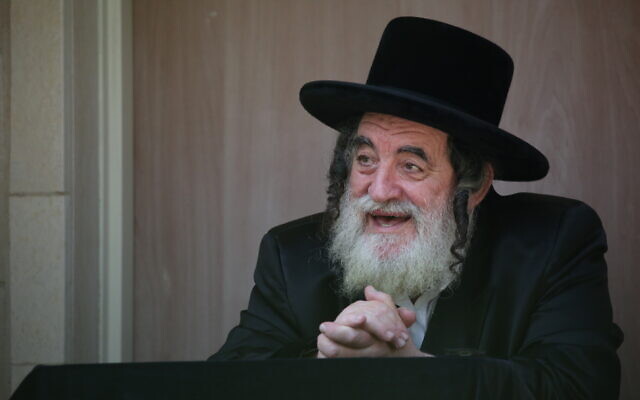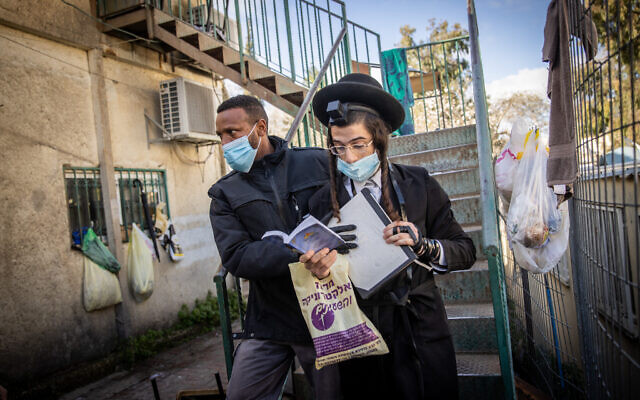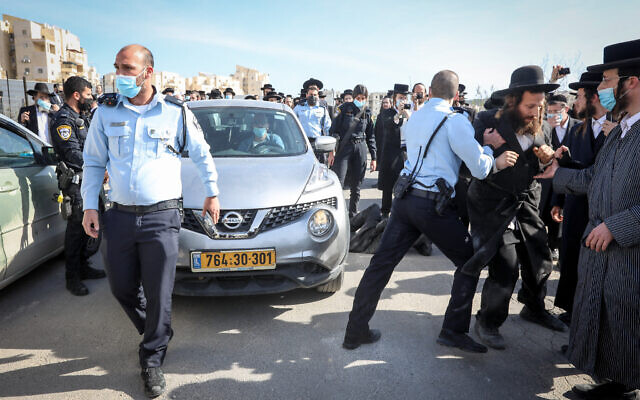Following outcry, Rabbi Yisroel Hager, leader of the Vizhnitz sect, says all must follow the health rules, opposes violence against police

The head of the Vizhnitz Hasidic dynasty called for ultra-Orthodox schools to reopen Sunday in defiance of government lockdown measures, before apparently backtracking hours later.
“This is crucial for us,” Rabbi Yisroel Hager said in a message to his followers, who mostly live in Bnei Brak and Beit Shemesh, stressing that “if there is a problem they should come to me,” according to Hebrew-language media reports on Saturday night.
Hager told his followers that when opening the educational institutions they “should not provoke police, throw stones, or call them “Nazis’,” a slur heard during clashes in the ultra-Orthodox community. He also asked that his comments be publicized in the Hamodia newspaper.
In an apparent retraction later on Saturday night, Hager said his comments were an “expression of pain” on the closure of schools and ordered his followers to heed the health rules and get vaccinated.
His remarks will not be published by the ultra-Orthodox daily, according to reports.
Police in response stated they would continue to enforce virus restrictions, “in all communities.”
The lockdown, in its third week and extended till January 31, has shuttered all nonessential businesses and also closed down the entire education system, excluding special education. Some ultra-Orthodox schools, however, have continued to operate in violation of the rules.
Hager’s instruction came after clashes broke out between police and rioters opposed to coronavirus lockdown restrictions in the predominantly ultra-Orthodox city of Bnei Brak overnight Thursday-Friday, after a mob in the city injured a police officer on patrol. At least six people were arrested for disturbing public order.
The rioters belong to an extremist faction of the Vizhnitz Hasidic sect, according to Hebrew media reports.
Prime Minister Benjamin Netanyahu condemned the attack in Bnei Brak, stating that “we will act with a heavy hand against law-breakers, first and foremost against those who raised their hands against our policewomen and policemen.”
Yisrael Beytenu chairman Avigdor Liberman took to Twitter Saturday evening following the call on Haredi schools to reopen, stating that “Bibi’s landlord has gone crazy and we all pay dearly for it,” referring to the prime minister’s political alliance with Haredi parties.
Critics have accused Netanyahu of avoiding cracking down on the Haredi public in order not to anger his ultra-Orthodox coalition partners.
Additional reports of lockdown violations among the ultra-Orthodox emerged Saturday, including a mass gathering over the weekend in the Sanz Hasidic sect in Netanya. Other sects are expected to hold prayers and gatherings this week.

On Thursday, Health Minister Yuli Edelstein called for jailing those who broke lockdown rules.
Netanyahu and Edelstein made appeals last week to Rabbi Chaim Kanievsky, a leading ultra-Orthodox rabbi, asking that he influence the community to obey the lockdown.
According to the Haaretz daily on Saturday, Kanievsky gave permission for some ultra-Orthodox schools to reopen this week, but only if it does not spark a confrontation with police. The report said some schools are hesitant to reopen despite his approval.
Haredi communities have suffered disproportionately from the coronavirus, with infection rates in many ultra-Orthodox areas several times that of non-Haredi areas.
As of Tuesday, some 22.1 percent of daily tests from Haredi areas were coming back positive, compared to 9.2% in the general population, according to Roni Numa, head of the ultra-Orthodox desk at Israel’s coronavirus taskforce.
High infection rates among Haredim are partly due to large family size and environmental factors, but experts also blame rule-breaking in large pockets of the community, often supported by rabbis and other community leaders.
Numa told Hebrew-language media that even in the current lockdown, some 15% of Haredi educational institutions were operating, and said that some 12,000 ultra-Orthodox students had contracted the coronavirus in the last month.

There has been near-daily violent pushback against enforcement of the national lockdown aimed at curbing the pandemic in some parts of the ultra-Orthodox community. Other groups in the Haredi community abide by the restrictions. Many Haredi rabbis and political leaders have shut schools, called for health guidelines to be kept and tried to encourage vaccination.
As reported by The Times of Israel
